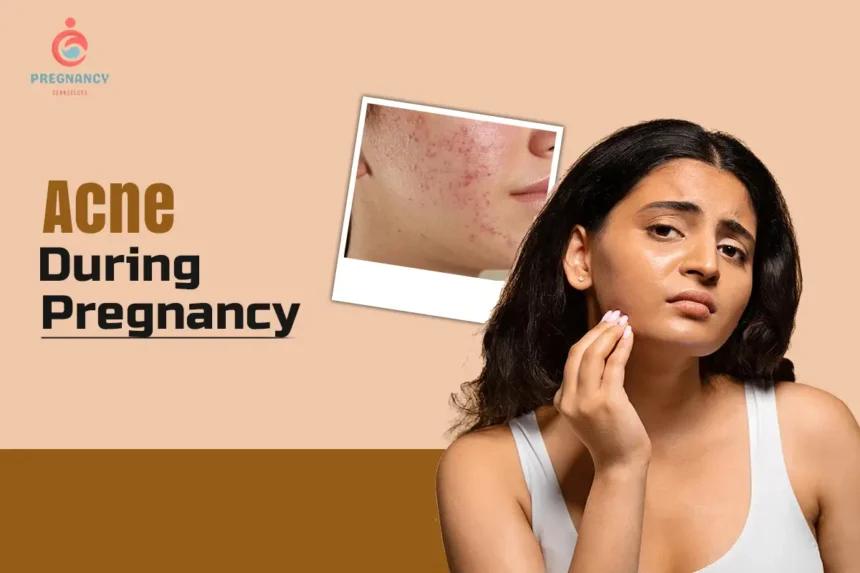Pregnancy is an exciting journey, but it brings many physical and hormonal changes that can affect your skin. One of the most common skin issues during pregnancy is acne. While it is often considered a teenage problem, acne can affect adults too, especially during pregnancy when hormonal fluctuations are at their peak.
Understanding why acne occurs during pregnancy, recognizing the symptoms, and knowing safe treatment options can help expectant mothers maintain healthy skin without compromising the safety of their baby.
What Causes Acne During Pregnancy?
The main culprit behind Acne During Pregnancy pregnancy acne is hormonal changes, specifically the increase in androgens. These hormones stimulate the sebaceous (oil) glands in your skin, leading to excess oil production.
Other contributing factors include:
- Increased Sebum Production: Hormonal surges make the skin oilier, which can clog pores.
- Stress: Pregnancy can be emotionally and physically stressful, and stress can trigger acne breakouts.
- Diet: High sugar and processed foods may worsen acne in some individuals.
- Genetics: If you had acne before pregnancy, you might be more prone to experiencing it during pregnancy.
It’s important to note that acne during pregnancy is not caused by poor hygiene. Over-washing or scrubbing too hard can actually worsen the condition by irritating the skin.
Common Symptoms of Pregnancy Acne
Pregnancy acne can vary from mild to severe. Some common symptoms include:
- Red, inflamed pimples and pustules
- Blackheads and whiteheads
- Oily skin
- Breakouts primarily on the face, chest, and back
In some cases, pregnancy acne may appear suddenly, even if you had clear skin before. It usually begins during the first trimester and may improve in the second trimester, although this can vary from person to person.
Safe Acne Treatments During Pregnancy
Treating acne during pregnancy requires caution because some medications can harm the baby. Here are safe options:
1. Topical Treatments
- Benzoyl Peroxide: Considered safe for mild acne, it helps kill bacteria and reduce inflammation.
- Azelaic Acid: Effective for reducing pimples and pigmentation, and safe for pregnant women.
- Glycolic Acid: Can be used in mild concentrations to exfoliate and unclog pores.
2. Skincare Routine
Maintaining a gentle skincare routine is crucial:
- Wash your face twice daily with a mild cleanser.
- Use oil-free, non-comedogenic moisturizers to keep skin hydrated.
- Avoid harsh scrubs or abrasive treatments that can irritate your skin.
3. Lifestyle Changes
- Drink plenty of water to keep skin hydrated.
- Eat a balanced diet rich in fruits, vegetables, and whole grains.
- Avoid excessive sugary or fried foods that may trigger breakouts.
- Manage stress through yoga, meditation, or gentle exercise approved by your doctor.
Treatments to Avoid During Pregnancy
Certain acne medications are unsafe during pregnancy and should be avoided:
- Isotretinoin (Accutane): Highly effective for severe acne but can cause birth defects.
- Tetracycline Antibiotics: Can affect fetal bone and teeth development.
- Topical Retinoids (Retinol, Tretinoin): Can be absorbed through the skin and pose risks to the baby.
Always consult your dermatologist or obstetrician before starting any medication or treatment during pregnancy.
Natural Remedies for Pregnancy Acne
Many expecting mothers prefer natural remedies. Some safe options include:
- Honey: Has antibacterial and anti-inflammatory properties. Apply a thin layer to pimples for 10-15 minutes.
- Aloe Vera: Soothes inflamed skin and promotes healing. Use pure aloe gel directly on affected areas.
- Oatmeal Masks: Helps reduce inflammation and absorb excess oil. Mix with water to create a paste and apply to the skin.
- Green Tea: Rich in antioxidants, it can reduce redness and calm breakouts. Apply cooled green tea to your skin or drink it regularly.
When to See a Dermatologist
While most pregnancy acne is mild and manageable, consult a dermatologist if:
- Acne is severe and painful
- There are cysts or nodules forming
- Over-the-counter treatments are not effective
- Scarring begins to appear
Dermatologists can recommend pregnancy-safe prescription options, such as topical antibiotics or azelaic acid formulations.
Skincare Tips for Moms-to-Be
Here are some additional tips to keep your skin healthy during pregnancy:
- Use Non-Comedogenic Products: Choose skincare and makeup labeled “oil-free” or “non-comedogenic.”
- Avoid Overwashing: Too much cleansing can strip the skin of natural oils and worsen acne.
- Sun Protection: Hormonal changes can cause pigmentation. Use pregnancy-safe sunscreen to prevent dark spots.
- Moisturize: Even oily skin needs hydration. Use light, water-based moisturizers.
- Gentle Exfoliation: Use mild exfoliants once or twice a week to remove dead skin cells without irritating your skin.
Managing Emotional Impact
Acne during pregnancy can affect self-esteem and confidence. Remember, breakouts are temporary, and your body is going through significant changes.
- Talk to your partner or friends about your concerns.
- Avoid comparing yourself to other pregnant women on social media.
- Focus on overall wellness and remember that your skin usually improves after childbirth.
Post-Pregnancy Skin Care
Many women notice that acne improves after delivery, although some may experience postpartum breakouts due to hormonal shifts.
- Continue using gentle, non-comedogenic products.
- Consult a dermatologist if acne persists or worsens.
- Breastfeeding mothers should check medication safety before using prescription acne treatments.
Conclusion
Acne during pregnancy is common and mostly caused by hormonal changes. While it can be frustrating, understanding the causes and using safe treatments can help you maintain clear skin without compromising your baby’s health.
Pregnancy acne is temporary, and with proper skincare, lifestyle changes, and medical guidance, most women can manage breakouts effectively. Always consult your healthcare provider before trying new medications or treatments.

